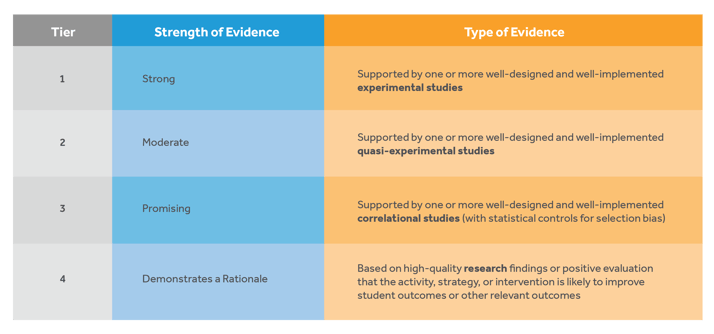
The Every Student Succeeds Act (or ESSA) provides schools and districts with funding for technology and also includes non-regulatory guidance on how to determine whether an edtech program is effective.
While ESSA’s predecessor, No Child Left Behind also contained a few points around program efficacy evaluations, ESSA takes that one step further and categorizes possible program evidence into four tiers (three for individual studies, and a fourth for other evidence): Details on each type of study can be found in the What Works Clearinghouse Workbook.
Details on each type of study can be found in the What Works Clearinghouse Workbook.
But educators shouldn’t rely solely on this tier system. An edtech program can be rated as having “strong” evidence based on a single randomized control trial, done many years ago, on a version of a product that no longer exists.
That study might also be on a state assessment that hasn’t been around for years, or on a small sample and a specific type of school or student body. And because these ratings do not expire, companies can stop submitting their products for evaluation once they obtain a single “gold standard” study that falls into the first tier.
Because rigorous studies have historically been rare, it’s still up to the individual to critically look for the pattern of evidence for each product they are considering.
Aggregated website lists may be a good beginning for someone starting to look for primary source information, but it is still up to the individual educator to ensure that the studies quoted are applicable enough to their school or district, recent enough, and effective based on relevant assessments.
The answer to the question is not so much as a “where to look,” but “what to look for.” Here at MIND, we believe a high volume of effectiveness studies is the future of a healthy market of product information in education.
We believe that a truly effective program will:
In order to know whether a program will be effective for your district, your schools and your students, you need to look for studies (multiple studies!) that reflect your population, your assessments, and the version of the program you are looking to start using.
See below for more resources on how to evaluate EdTech and our philosophy:

Andrew R. Coulson, Chief Data Science Officer at MIND Research Institute, chairs MIND Education's Science Research Advisory Board and drives and manages all research at MIND enterprises. This includes all student outcomes evaluations, usage evaluations, research datasets, and research partnering with grants-makers, NGOs, and universities. With a background in high-tech manufacturing engineering, he brings expertise in process engineering, product reliability, quality assurance, and technology transfer to edtech. Coulson holds a bachelor's and master's degree in physics from UCLA.
Comment